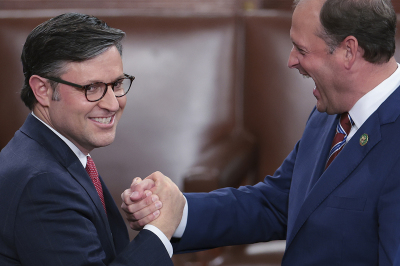Speaker Johnson is right about the separation of church and state

Since Speaker Mike Johnson’s (R-La.) unexpected election to lead the House of Representatives, progressives have busied themselves levying an array of brutal and sometimes slanderous attacks against Johnson. One of the top progressive talking points seems to be that Johnson allegedly has no respect for the “separation of church and state.” Yet, when properly understood, the evidence for such allegations quickly unravels.
One Washington Post opinion column lamented that “Johnson got right to work mixing church and state in his first speech after he won the speakership.” How did Speaker Johnson accomplish this in one short speech according to the Washington Post columnist? Well, he referenced the Bible. In his speech, Johnson said, “I believe that Scripture, the Bible is very clear: that God is the one that raises up those in authority. And I believe that God has ordained and allowed each one of us to be brought here for this specific moment.”
This is a beautiful and unifying statement from Johnson directed at all his colleagues in the House, including many Democrats with whom he would disagree deeply. It is also a very common belief among Christians that is rooted in the Bible. Perhaps the thought of a sovereign God that involves himself in human affairs makes atheists uncomfortable. Regardless, Johnson wasn’t saying that God is running the House of Representatives, but rather that God “ordained and allowed” the current House leadership. That’s not arrogant, it’s humble. Johnson recognizes that there is much outside of his control — or anyone’s control — and he submits to God’s guidance and plan.
Most complaints against Johnson’s alleged lack of respect for separation of church and state involve Johnson simply articulating his religious beliefs or quoting the Bible. Is this really a danger to the United States system of government? According to Johnson’s opponents, the answer might be “yes.” But what is really going on here?
First, we must understand what the separation of church and state is. The origin of that phrase is attributed to a letter from Thomas Jefferson addressed to the Danbury Baptists in which Jefferson referred to the Establishment Clause in the First Amendment as “thus building a wall of separation between Church & State.” When understood in reference to the Establishment Clause, Jefferson is not wrong that the Establishment Clause (which states that “Congress shall make no law respecting an establishment of religion”) is a clear boundary preventing the U.S. government from adopting or enforcing a state religion. And of course, American Christians would affirm this. There is no mass movement that wants to see the U.S. government enforce any religion on anyone.
However, what progressives often downplay is the First Amendment’s Free Exercise Clause, which directly follows the Establishment Clause. This states that Congress can make no law “prohibiting the free exercise” of religion. This protects citizens’ ability to express their beliefs and practice their faith, including in the public square.
“Separation of church and state” is not a phrase found in the Constitution, and it is not necessarily a guiding principle we ought to cling to. Instead, we should be emphasizing all our First Amendment protections for religious freedom, both the prevention of a state church because of the Establishment Clause and the freedom to fully live according to our faith and express our beliefs because of the Free Exercise Clause. These are important constitutional principles that we should all be able to affirm and celebrate.
A recent ABC News article railed against Speaker Johnson for something he said on a podcast in September 2022, in which he referred to the “so-called separation of church and state” and said “the founders wanted to protect the church from an encroaching state, not the other way around.” This is exactly right. A straightforward reading of the First Amendment shows this.
The reason that Speaker Johnson would refer to a “so-called separation of church and state” is that progressives have so misinterpreted the phrase that it no longer reflects Jefferson’s original meaning. The way progressives misuse the term leads them to argue that any public display of religion at all is perceived as an assault on separation of church and state. It is this misconception that drives their attacks against Speaker Johnson.
The Founders never would have fought for a freedom from religion. This progressive attack on religious practice and expression is unfair and deeply un-American. There was no understanding among the Founders of a “separation of church and state” that would have prevented an elected official from quoting the Bible or making the Bible the basis of his worldview. The First Amendment not only allows these public expressions of faith — it clearly protects them.
There are many ways that Speaker Johnson stands out as an exceptional leader and Speaker, but his understanding of separation of church and state is not one of those. His interpretation of the First Amendment is accurate and, frankly, unexceptional.
Originally published at The Washington Stand.
Arielle Del Turco is Assistant Director of the Center for Religious Liberty at Family Research Council, and co-author of Heroic Faith: Hope Amid Global Persecution.




















